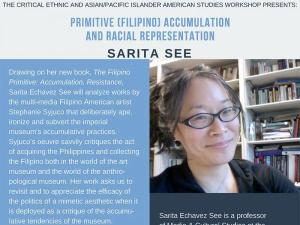Primitive (Filipino) Accumulation and Racial Representation


This talk is part of the Critical Ethnic and Asian/Pacific Islander American Studies' 2018 Speaker Series, "ORIENTATIONS: On Empire, Settler Colonialism, and Occupation."
On 3.16.18 CEA/PIAS will host a graduate student workshop with Prof. See from 1-2:30 pm in Haven Hall 3773 (RSVP with Michael at pascualm@umich.edu). The public lecture will be held from 4-5:30 pm in Haven Hall 3512.
Sarita Echavez See is a professor of Media & Cultural Studies at the University of California Riverside and the co-founder of the online platform Center for Art and Thought: http://centerforartandthought.org/. She is the author of The Decolonized Eye: Filipino American Art and Thought (U of Minnesota P) and The Filipino Primitive: Accumulation and Resistance in the American Museum (New York UP); and a co-editor of Critical Ethnic Studies: A Reader (Duke UP).
Abstract:
Sarita Echavez See will analyze works by the multi-media Filipino American artist Stephanie Syjuco that deliberately ape, ironize and subvert the imperial museum’s accumulative practices, what cultural theorist Allan Isaac has called “acts of assimilation gone awry.” Syjuco’s oeuvre savvily critiques the act of acquiring the Philippines and collecting the Filipino both in the world of the art museum and the world of the anthropological museum. Her work asks us to revisit and to appreciate the efficacy of the politics of a mimetic aesthetic when it is deployed as a critique of the accumulative tendencies of the museum. The talk draws from See’s new book The Filipino Primitive: Accumulation, Resistance, and the American Museum. This interdisciplinary study of epistemological and aesthetic politics juxtaposes an analysis of Karl Marx’s concept of primitive accumulation with that of the phenomenon of accumulating the primitive—the barbarian, the uncivilized, the savage—by focusing on the representation of the Filipino in American imperial museum collections as well as in Filipino American theatre, writing, and art.
